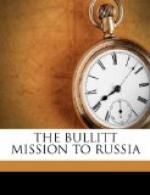Senator BRANDEGEE. Do you know what his objection was to the legislative bodies of the contracting parties having representation on the assembly?
Mr. BULLITT. The President believed, I think—in fact, it was so stated to me by Col. House, who discussed the matter with me—that it would make too unwieldy a central organ for the league.
Senator BRANDEGEE. Do you understand why it would be any more unwieldy if Congress should appoint the delegates than if the President should?
Mr. BULLITT. It would necessitate a larger central body if representation was to be given to the important political parties of the various countries. It would have necessitated a body of, say, 10 representatives from the United States—5 from the Republican party and 5 from the; Democratic Party, in the assembly of the league, which would become a large body.
Senator BRANDEGEE. The idea was that the political parties of the country should be represented?
Mr. BULLITT. Yes, the political viewpoints should be represented so that you would get some connection between the central assembly of the league and the true opinion of the countries.
Senator BRANDEGEE. When you went across to Paris on the George Washington with the President do you know whether he had with him at that time any draft for a league of nations or any memorandum that he showed to you of discussed with you?
Mr. BULLITT. The President outlined to several of us one evening, or rather one afternoon, the conception he had at the time of the league of nations. I did not see any formal draft that he had, but the President made a statement before the council of 10, in one of these minutes from which I have been reading, stating that he had first—and in fact I think I know it from other sources—that he had first received the Phillimore report, that then it had been rewritten by Col. House and that he had rewritten Col. House’s report, and after he had discussed his rewriting with Robert Cecil and Gen. Smuts, he had rewritten it again.
Senator BRANDEGEE. You stated substantially that the only part of the league draft which was laid before the Peace Conference which the President had his way about, was Article 10. Did you make some such statement as that?
Mr. BULLITT. Yes, sir.
Senator BRANDEGEE. The President stated to us that that was practically what he had submitted to the Niagara conference here when the ABC powers from South America were discussing the Mexican question. He had then considered it as an article for American use on this continent.
Do you know what the attitude of Gen Smuts was as to article 10 as proposed by the President?
Mr. BULLITT. I do not, sir. Again, full minutes of the discussions and conclusions reached of all these meetings of the committee on the league of nations were kept.
Senator BRANDEGEE. Did you read the various other plans that were proposed or suggested over there for a league of nations?




